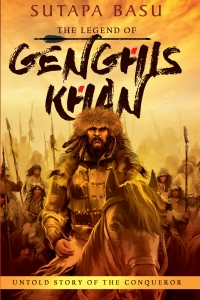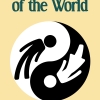
Prologue
River Indus exploded from the Hindu Kush Mountains furiously frothing and churning down the gorge that edged the quiet town of Malikpur. Its mighty roar had reverberated across the valley for years. Yet, this powerful voice would soon quail at the agonised shrieks from the little hamlet that would tear apart the tranquil skies of the vale. Light glimmered on the eastern horizon as Wasim halted to try out his slingshot. Companion to the seven-year-old prince, son of Sultan Jalal-ud-din, Wasim wanted to be prepared to defend him, if necessary. With steady hands, the mountain lad pulled back the throngs and let go. The shot flew straight to the target which plopped to the ground; a black crow. Instantly, hundreds of black birds bolted up dotting the rosy dome overhead with inky smears. The clamour of fluttering wings filled Wasim’s ears, deafening him momentarily. Consequently, he did not catch the sudden thunder of hooves splintering the new-born day.
A tremendous pounding reverberated the ground underfoot startling him. Horsemen? Early morning? That always means trouble. Fear clutched Wasim’s heart and he began to run the few yards to the palace gates. But the horses were faster. They were coming from the direction of the Indus River, Wasim realised; not a few but hordes of horses were thudding up the sandy banks, crashing through the undergrowth spraying rocks and clods of earth along the track to the town. They were nearly on him as he swerved behind some uneven heaps of earthen pots piled before a locked potter’s hovel and ducked down. He was just in time for the yelling horsemen flew past in a cloud of dust. In their wake, the pots teetered in the rushing wind. Wasim steadied the pots with both hands and then cautiously peeped through them. Shouts and screams of terror-stricken townspeople waking in panicky confusion rang in his ears. Who are these men? What is happening? Wasim wondered. Through the dust, he could see smoky red smudges. They are firing the houses. . .why? Some horsemen were milling around the palace gates. When the boy observed them carefully, he broke out in cold sweat. Garbed in thick tunics with pantaloons stuffed into long leather boots, shaggy beards, long braids flying from furry caps, weather-beaten faces with flat, broad noses and narrow, slit eyes, they were no other than the fearful Mongols. Wasim recalled the prince’s tales about how his father, the Sultan had fought these terrible nomadic legions but had been defeated. He had escaped their clutches by diving into the Indus River that plunged from the mountain ridges all the way to Malikpur. Desperately swimming across the vast expanse of swift waters had saved the Sultan because the Mongol warriors were afraid to breach treacherous currents. Just a month ago, the Sultana, his wife who was also Princess of Ghaznin, and his son had come down from Ghaznin to Malikpur since it was safer here.
But, now the Mongols had come to Malikpur.
Two of the Mongol soldiers had dismounted and clashed with the four guards at the palace gates, cutting them down. Their bodies sprawled before the gates, blood darkening the dirt. The Mongols waved short, broad swords, quite different from the curved, thin scimitars of the Sultan’s soldiers. On their backs were slung heavy bows curved at both ends and quivers full of arrows. Blood-curdling whoops and bellows along with terrified squeals and screeches carried back to Wasim from the other end of Malikpur. He could see thatches already aflame. People were being dragged out of the burning houses and chopped down. As he watched, a small boy of about six years came running down the track followed by a mounted Mongol. As the rider drew abreast of the child, he stooped and simply sliced off the boy’s head which tumbled to the ground. The torso took a few more steps before it collapsed. Wasim gripped his throat to choke back a scream.
Beyond the palace, all the houses built of stone or mud were on fire. Smoke rose in heavy, black clouds from the small town. Even the crops in the fi elds had been sparked off. Wasim’s view was obscured by curtains of smoke. But, whenever they parted, he could hardly believe the horrible scenes they revealed. It was like a nightmare; a near-naked, screeching woman hauled through the dust by her ankles clutched in the fists of a hefty, bearded giant.
Even as Wasim looked in horror, a group of barbaric attackers pounced on her, literally tearing her apart like mad dogs in their ferocity to rape her; men, women, children turned into fiery torches spinning out of flaming houses; babies being snatched from the arms of screaming mothers, flung up in the air and being caught on wickedly gleaming spear points, their little bodies skewered like lumps of roasted meat. A few soldiers were grabbing people by their hair, two or three at a time, and nonchalantly hacking their heads off, saving time by not killing one at a time, as if they were slaughtering chickens. Wasim stuffed his knuckles into his mouth, eyes wide with terror.
Suddenly, he was distracted by angry shouts and the clanging of swords on the other side of the palace walls. So, now the att ackers were inside the palace and the Sultan’s soldiers must have joined battle with them. Could the Sultan’s soldiers save Malikpur? However, Wasim couldn’t help wondering, why are the Mongols att acking Malikpur? This is a small town. Other than these few soldiers, it didn’t even have an army.
A thought struck him.
Have they come after the Sultan? But he has left ...nearly fourteen days ago. Only the little prince and the Sultana are here.
Another scream made him turn towards the palace. What he saw stunned him. Two Mongols were pulling the Princess by her long, loose hair through the gates. She was resisting them while her old maid had grabbed her by the waist to stop the soldiers from dragging her out. The maid screamed abuses at the soldiers. She was telling them that this was the Sultana. . .a princess; that she was the Sultan’s wife; that she cannot be treated vilely like any ordinary woman. They took no notice of her and kept heaving at the princess. For the fi rst time, Wasim noted how the Sultana’s round, flat face and narrow, tilted eyes somewhat resembled the faces of the Mongols. Then he pushed aside the irrelevant thought. He tried to think how he could save the Sultana.
All of a sudden, a whirlwind came through the gate. It was the little prince. He flung himself at the soldiers, biting and kicking them. Surprised, the men let go of the Princess. Instantly, the mother ran to her child, pried him off the soldiers and tried to hide him under her cloak. But it was a vain attempt. One of the mounted men bent down and grabbed a handful of the prince’s long hair. Easily, he wrenched him, kicking and struggling, out of the Princess’ arms. His companions guffawed at the squirming, dangling boy. Wasim felt like smashing a fist into their laughing faces. The riders began to toss the little prince from one to the other like a ball. The desperate mother screamed and tried to run to her son, but she was held back by two soldiers. Even as Wasim watched in horrified agony, the rider who looked like their leader shouted something. One of the mounted soldiers raised his sword. The little prince was tossed with perfect aim onto the point of his sword that pierced through the child like a knife through butter. The Princess collapsed in a faint in the maid’s arms. Even so, the soldiers snatched her from the maid and flung her senseless body before the skittish hooves of their leader’s horse. They uttered something, rapidly gesticulating towards the unconscious woman. The leader frowned looking down at her. Then he issued an order in a stern voice. Wasim saw the soldiers’ faces turn glum. They pulled the Princess upright and yanked her to a ragged group of nervous captives sitting beside the track, roped together, most of them paralysed with terror. The old woman still supported her half-conscious mistress.
A surge of red-hot rage suff used Wasim, melting away his fear. He stood up behind the pots and took aim with a large pebble in his sling. Pulling back the throngs as much as they would go, he took a shot. The projectile went like an arrow and hit the Mongol leader on his forehead. Wasim had the pleasure of seeing his head jerk back. Blood oozed out of a deep cut and dripped into the man’s eyes as he roared in pain. The soldiers on foot turned and rushed at the pile of pots but Wasim did not care anymore. Head and shoulders clear of his hideout, he aimed at the nearest soldier. The man yelped as the stone smacked him between the eyes. At the same time, the other Mongol soldier rushed headlong at the boy. His sword gored Wasim’s thin body, its point sticking out of his back. The world spun around darkly, and the ground rushed at a tremendous speed to meet the boy as Wasim whispered, ‘Allah! Al-Rahman! Al-Rahim! Al-Aziz!’
About the Author







Comments